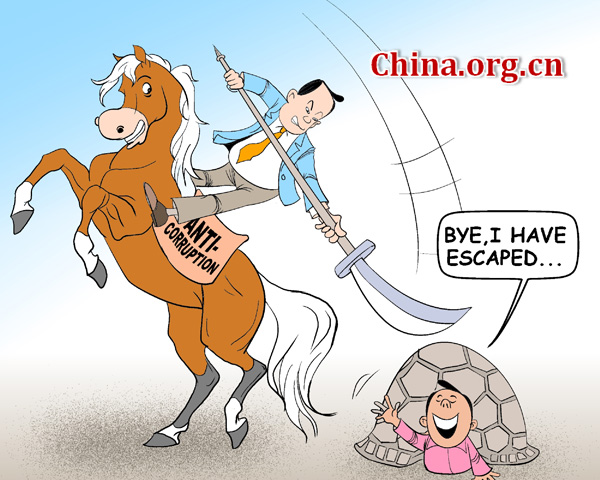Embrace the fight against corruption
 0 Comment(s)
0 Comment(s) Print
Print E-mail Xinhua, March 12, 2015
E-mail Xinhua, March 12, 2015
|
[By Jiao Haiyang/China.org.cn] |
When Chinese President Xi Jinping pledged a life-or-death fight against corruption in 2012, many Western observers and corrupt Chinese officials expected nothing more than a strong yet short-lived whirlwind.
Their reasoning: corruption was so deeply woven into China's political, economic and social fabric, that attempts to challenge this "status quo" would fall flat or worse, hurt the economy, disrupt social order and jeopardize the party's rule.
Two years later, the whirlwind has grown into a windstorm targeting both high-ranking "tigers" and low-level "flies".
China's top prosecutor Cao Jianming said on Thursday that 28 officials at the provincial or ministerial level or higher were probed for corruption last year, including Zhou Yongkang and Xu Caihou.
And instead of derailing China's economic and political train, the storm is revitalizing a country long plagued by corruption.
In the economic circle, the anti-graft campaign is cutting back the fiddling and fraudulent hands of corrupt officials. As China tackles economic slowdown, such efforts will help lessen burden for companies and create a cleaner investment environment.
The repercussion can also be felt in social spheres, with the gift-giving culture ebbing away, official extravaganzas shunned and "artworks" by officials attracting fewer fawning buyers. The country's social ethos have turned against corrupt activities.
But as the anti-corruption war enters its third year, questions are being raised over the future of the campaign.
On March 2, Lyu Xinhua, spokesman for China's political advisory body, which is convening its annual session, promised "no limit or ceiling" for China's anti-corruption effort. On the same day, China's military authority released a list of 14 generals convicted of graft or placed under investigation.
But the ambition of the CPC goes beyond purging corrupt officials. On Sunday, top legislator Zhang Dejiang said China plans to develop national legislation to fight corruption.
The legislation is widely expected to set clear codes of conduct for Chinese officials to prevent them from being corrupt. If passed, it will mark a major step in institutionalizing the anti-graft drive.
More importantly, it shows China's anti-corruption drive is not meant to be a temporary political movement, but that the CPC is willing to take up a life-long battle and subject it to the rule of law.







Go to Forum >>0 Comment(s)